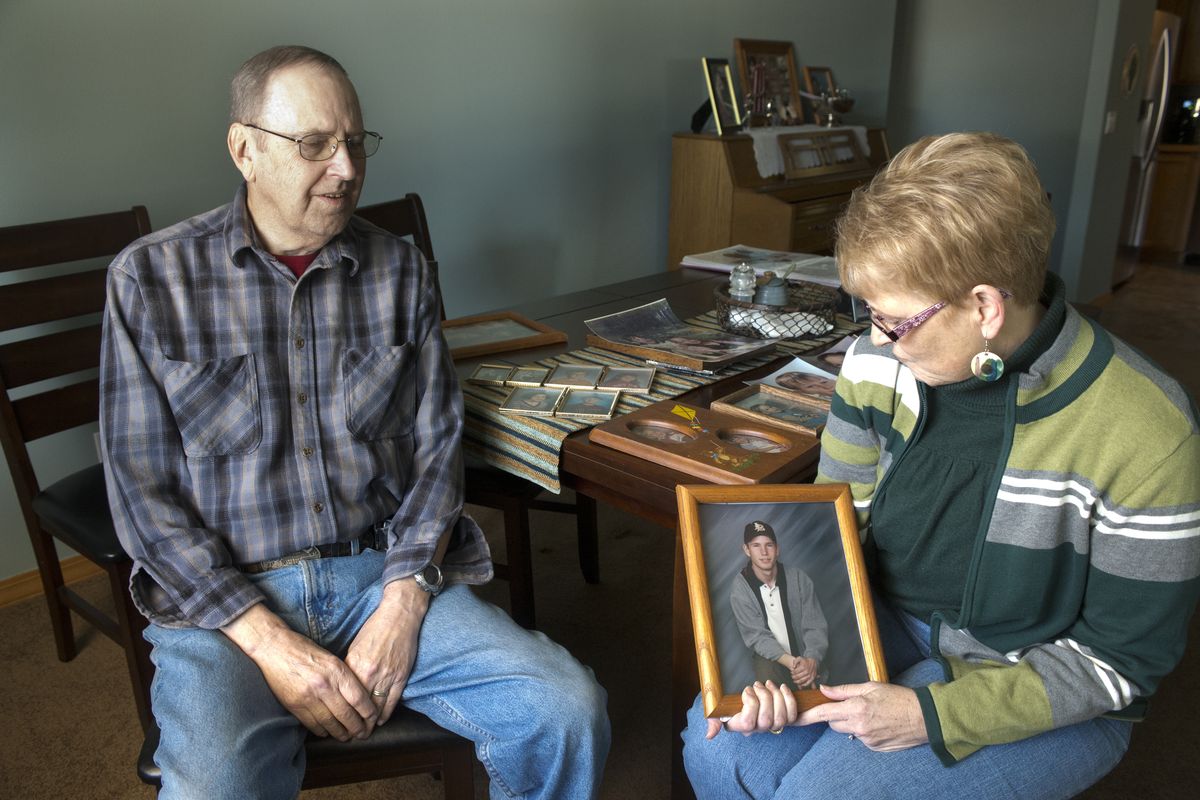Parents of man shot by police concerned about his mental care

“They wouldn’t let him wear a hat for school pictures,” said Sharon Johnson of the photo. “So I took him to Sears.”
Aaron Johnson has been hospitalized for nearly three weeks after police officers, responding to an assault call outside a Spokane homeless shelter, shot him multiple times last month.
Sharon Johnson said her son suffers from a genetic predisposition to schizophrenia that ended his education in high school and landed him in jail as well as on the streets.
“His junior and senior year, he’d go away for several weeks at a time,” Sharon Johnson said of the child she and her husband, Geri, adopted at 11 weeks old, along with an older sister.
Johnson visited her 29-year-old son for the first time Friday, more than two weeks after the Jan. 16 shooting outside Truth Ministries. Aaron Johnson threatened occupants with a knife and a piece of lumber before police approached him in an alley near the homeless shelter at 1910 E. Sprague Ave., according to court documents. Police used a stun gun in an attempt to subdue Johnson before he lunged at an officer, prompting patrolmen Holton Widhalm and Chris Conrath to fire.
After viewing her son’s injuries Friday, Sharon Johnson said there were a total of eight bullet wounds. Nursing staff said he’d been struck in the lung and liver; a plate was placed in his arm and he was wearing a back brace, Johnson said.
Her long wait to visit was caused by a round-the-clock police guard that ended Thursday, Johnson said she was told.
She said officers called to tell her they’d been spending “too much money and manpower” on her son.
For weeks, Sharon Johnson had no word on Aaron’s condition other than his admission to the hospital. She said hospital staff were the ones to tell her he’d been shot.
The family is now in limbo because of federal privacy laws, Sharon Johnson said. Her son is refusing to see her or her husband and has asked that his parents be left out of any treatment decisions.
“He’s shut down,” Johnson said of her son. “I got a call from a psychiatrist who was going to do a mental exam on him. I can tell her anything I want to, but she can’t tell me anything.”
Aaron Johnson has been prescribed medication that limits his psychotic episodes, Sharon Johnson said. She’s worried he hasn’t been taking this medicine and will continue to avoid doing so unless ordered by mental health professionals.
“He won’t do anything unless you force him to do it,” she said.
Sharon and Geri Johnson adopted Aaron and his sister, Megan, from a woman in Kennewick. The couple didn’t have children of their own, Sharon Johnson said, and decided time was running out.
“He was a sweet little boy, so loving,” Sharon Johnson said, flipping through photos of Aaron dressed in a karate uniform, ripping open Christmas gifts and smiling in a pair of striped overalls.
As he approached his final years of high school, however, he withdrew from class work and a psychiatrist prescribed drugs he hated, Sharon Johnson said. When he turned 18, he stopped taking them, and his condition worsened.
Stints in jail and halfway houses followed, she said, but Aaron never physically threatened his parents. That ended in September, when he stayed with Sharon and Geri Johnson for several days following the death of his 31-year-old sister.
“He talked to her an awful lot more than us,” Sharon Johnson said.
One day, her son was having a particularly bad bout of delusions. He came into the living room and apologized for his behavior, then struck her on the side of her head, knocking her glasses from her face, she said.
The Johnsons tried to find housing for their son. But because of his criminal history, most turned him away, his mother said.
The last time the family heard from their son before the shooting was about a week before the incident, Sharon Johnson said. They would frequently receive phone calls from him while he was downtown, driving to pick up groceries or clothing he needed.
“There were times when I thought I was a bad mother,” Sharon Johnson said, tears welling in her eyes. “But both my kids would tell you they wouldn’t want to be anywhere else.”
Aaron Johnson’s court date on an expected second-degree assault charge has been pushed back multiple times, with a first appearance on the charge now scheduled for early next week.
Because he’s not in custody, Sharon Johnson said she worried her son would be released without treatment for his mental illness once his wounds healed. But hospital staff told her that Aaron Johnson wouldn’t be released to the streets before his court appearance based upon his mental and physical condition.
The family remains concerned that Aaron won’t find the help he needs in a community with dwindling resources for patients requiring long-term mental health care.
The Washington state Department of Social and Health Services reports funding for publicly run mental health facilities in 2013 remained about 10 percent below levels in 2008. As a result, a couple hundred beds for patients with chronic mental illness have vanished in the past few years.
“We’re hoping for long-term care for him,” Sharon Johnson said. “But I’m just not sure how it’s going to happen now.”